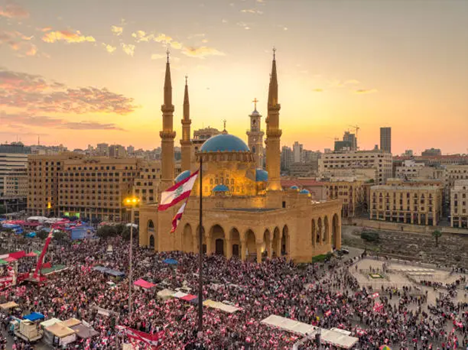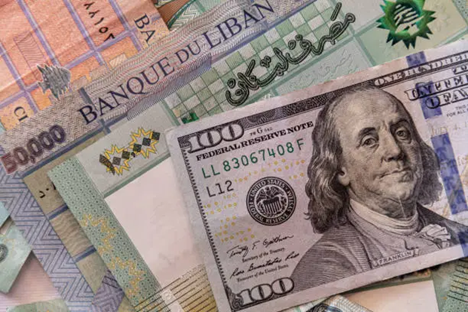An insight into the life of Lebanese People.
- Antoine El Husseini
- Sep 14, 2023
- 7 min read
Author: Antoine El Husseini Published: 14/09/2023
This is a journalistic piece of writing aiming to show how the lives of the Lebanese people have been negatively affected during the economic crisis and the pandemic. Two Lebanese citizens, from different age groups, have been interviewed for this article about their daily struggles and mental health. Mental health is a very important and serious topic in our generation, which is why this article circulates around this issue.

Lebanon, also known as the Switzerland of the Middle East, was considered a banking hub and a prosperous nation, with its economy fuelled by a vibrant tourism industry, thriving banking sector, and a high standard of living. However, today, Lebanon is much different than how it was.
“ Everyone means everyone!” is what the protesters were yelling on the streets of Beirut during the October 2019 revolution demanding everyone in the parliament to resign.
The economic situation in Lebanon started to decline that year, and it will go down as one of the worst economic collapses in modern history. Corruption and money mismanagement were the leading causes for the disastrous inflation.
To this day, national politicians are living a lifestyle unaffected by the situation they have created, meanwhile the Lebanese citizens have been suffering daily ever since.
The impact of economic and pandemic crisis on Lebanese people.
The coronavirus pandemic struck in 2020.
Imagine the life you are used to living is taken away from you. Going to school or university, enjoying a day out with your friends, receiving your paycheck from work, or even grocery shopping is considered to be a privilege now. The pandemic and economy led to a staggering 82% of Lebanese citizens to live under the poverty line.
Not only have the economic situation and the pandemic affected the Lebanese people’s daily lives, but it has also affected their mental health.
“After the coronavirus hit Lebanon and schools closed, what seemed like a two week vacation became a long stay at home,” says Maya Sawaya, a 20-year-old Lebanese university student majoring in Advertisement in Beirut. “When we started online learning, it was quite a difficult shift going from seeing my friends and teachers every day to barely hearing their voices through the laptop without even seeing them,” she says.

Lebanon also faces an electricity crisis that could cause a blackout in the entire country. It has greatly affected students who were studying from home during the pandemic. “It was hard with the occasional electricity cuts and internet disconnections in Lebanon. It was extremely stressful when we had exams online and the electricity or wifi got cut,” says Maya, as she discusses the struggles she endured during this difficult time.
“I did feel suffocated sometimes, since I felt trapped with my family every day for a long time, and I was constantly worrying about one of my family members getting covid, especially as my parents are already in their fifties,” she says.
Just like many other Lebanese teenagers, Maya had to worry about whether to flee her country to be able to continue her education.
“During my last year of school, I was wondering if I had to go to a foreign country, as it might be cheaper to study outside of Lebanon,” says Maya. She continues by expressing gratitude as she mentions that her parents were able to pay for her undergraduate degree in Lebanon. “Thankfully, my parents were able to afford a private university in Lebanon, but it was never easy for them or me.”

Unlike many other students Maya is fortunate to have a scholarship, which alleviates the financial burden from her parents. However, she still worries about losing the scholarship.
“I still feel sometimes that I'm not doing enough, and I stress that my grades are not up to my expectations. This is why I always try to pick myself up even when I'm anxious, stressed, or disappointed. It's important for me to keep my grades up not just for me, but to also keep my scholarship,” she says.
Maya has started therapy recently, which helps her deal with the stress and anxiety related to the financial situation and the pandemic. “Whenever I'm anxious I also take a couple minutes to remember and reflect over the fact that I'm doing what I have to do, and even though it might not be much, I'm still trying my best,” she says.
After what has been going on in Lebanon, it will take a lot of time for life to go back to how it was pre-inflation. Maybe, life will never be like before again, but hope is what drives the citizens to believe in a better future.
“As for hope, I do feel like I lost hope in Lebanon sometimes, but without hope no one would be able to continue forward with life. That is why, even if the situation gets harder, I still have hope that one day, Lebanon will be great again,” says Maya.
Maya still has her whole life ahead of her and she radiates with the enthusiasm, that there is a successful future awaiting her. However, what happened to the people who have worked their entire life, saved up for retirement, and suddenly lost everything?
The impact of the crisis for older Lebanese generations.
Shadia Ayoub, a 74-year-old Lebanese woman, lives with her husband in Dik el Mehdi, Mount Lebanon. She moved from Dubai and settled in Lebanon in 1984.
“Coming back from Dubai, my husband, my family and I, we had enough money to secure our future, we bought a nice flat, set the kids in schools and my husband started his construction business. We felt very secure and settled and kept the money in the bank, which made us feel even more secure, earning our monthly interest, which was more than enough to provide us with a high quality of life. Until one day all the dreams collapsed and we woke up to be penniless with no future in sight,” she says.
Shadia has been deeply affected by the economic situation. Unable to withdraw enough money from the bank or receive interest, she felt as if she was robbed from her own savings.

“This was happening in my country, which for me, was unbelievable. Also, the cases of the banks and how they stole our deposits that took us ages and years and hard work to collect and save, evaporated with no return,” she says.
After struggling financially for a year, the pandemic struck, which felt like another punch to the stomach. Being part of the vulnerable population and knowing that hospitals weren’t fully equipped to support patients, Shadia was terrified of getting infected with covid.
“There was fear everywhere. Corona kept its deadly work, ordinary patients were unable to be treated in hospitals, for lack of cash money and for lack of the necessary medication and the limited abilities of the doctors and nurses. This added terribly to my mental stress and made things worse,” she says.
Shadia had to take excessive precautions stay safe from the virus. But what also kept her home was her financial situation. Even if she wanted to go out to buy clothes or a cup of coffee, while wearing a mask and social distancing, she still wasn’t able to, because she couldn’t afford it.
“Living the same routine every day, like in a jail, I cannot go out due to the pandemic and shortage of money, and being unable to find the right solution for this mess we were put in, makes you feel you are in a real jail with handcuffs around your hands, and leg cuffs around your ankles, and a steel mask to stop you from breathing properly, sitting on your sofa in your pyjamas, unable to eat what you want or see the people you wish to,” she says.
According to the United Nations, a third of the Lebanese population is facing food insecurity. As the inflation grew in the country, food became more expensive and in short supply.

"We were like ants that only look for food to collect and store for the rainy days where food like meat and milk become scarce. Many kinds of food, especially the imported ones became rare and unable to find in the Lebanese market. The supermarkets had the upper hand in deciding the fate of the people with what to eat and how much to pay,” she says.
As the inflation and number of covid deaths rose daily, Shadia’s depression took over her body.
“I knew I was depressed but did not know how much till I started losing appetite and losing weight. As a result, I lost around 10kg in no time, and I lost interest in many things that make life pretty. I could not eat, I lost interest in talking to people, I even felt that I do not know how to talk anymore, my mind blocked from remembering interesting topics to discuss on the telephone with any of my friends,” she admits.
Being trapped at home, away from her children and grandchildren for over two years, led Shadia to reach her breaking point.
“What was happening was too much for me to bear. One day, I fainted and was carried to the hospital. The doctors confirmed my mental depression and suggested anti-depressant tablets to help me lift my mood and my morals, but I refused to take them insisting on my ultimate faith in my country and believing Lebanon will rise again from under the ashes as it did seven or eight times before,” she says.
As of today, the coronavirus is not an issue anymore in Lebanon, as most of the citizens are vaccinated. However, the future of the country is still undetermined. The citizens don’t have full access to their money in the bank and inflation is rising daily.
In 2023, Lebanon’s currency has lost more than 95% of its pre-crisis value, meanwhile the poverty rate slightly decreased by 2%. Thus, the economic crisis continues to deeply affect the lives of the Lebanese people, whether they are students or from the older generation.
“What I know for sure is that Lebanese people need new pyjamas and new sofa sets if this case is going to go on for a longer time,” she says as she looks to the ground with a smirk on her face, but tears in her eyes. “ We are a population left to find our salvation just by ourselves, the price we are paying is very high, but we will still survive as we did before,” says Shadia.
Antoine El Husseini is a second year student at the American University in Bulgaria, majoring in Journalism and Mass Communication, and Business Administration. He has a passion for writing and learning more about people's backgrounds. He is mostly interested in humanitarian causes an spreading the word about important issues occurring globally.



Comments